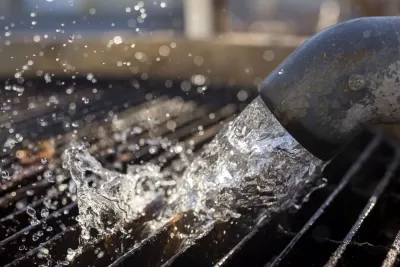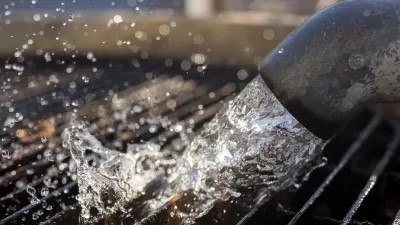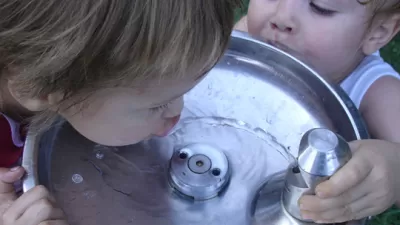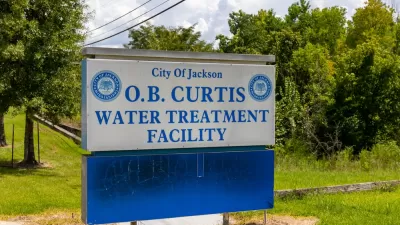One of the nation's most ambitious attempts to recycle wastewater into potable water received a huge lift last month from the EPA with the receipt of a $164 million loan under the now-permanent Water Infrastructure Finance and Innovation Act.

On Nov. 27, Mayor Kevin L. Faulconer joined U.S. Environmental Protection Agency Acting Administrator Andrew Wheeler in Washington, D.C. to officially accept a $614 million federal loan from the EPA's Water Infrastructure Finance and Innovation Act (WIFIA) program.
The loan will help finance the first phase of Pure Water San Diego – a project that will use proven water purification technology to clean recycled water to produce safe, high-quality drinking water, according to a city press release.
“This federal funding is validation that our Pure Water Program is cutting edge technology and a worthy investment for San Diego’s future water independence,” Mayor Faulconer said.
The first phase of Pure Water, estimated to cost $1.4 billion and scheduled to open in late 2023, would expand the City’s potable water production capacity by 30 million gallons per day to replace the use of imported water. Currently, the County of San Diego imports 85% of its water from the Colorado River and Northern California Bay Delta.
EPA’s WIFIA loan will help finance nearly half [the cost] – up to $614 million. Because the WIFIA program offers loans with low interest rates, the City is expected to save an estimated $184 million compared to a typical bond issuance.
“Through WIFIA, EPA is playing a leading role in President Trump’s efforts to upgrade our nation’s water infrastructure, create well-paying jobs, and ensure all Americans have access to clean drinking water," said Wheeler.
The City Council voted on Nov. 15 to authorize Mayor Faulconer to begin construction of Phase I of the Pure Water program. A groundbreaking, presumably at the future North City Pure Water Facility, is set for the spring.
The project received the fifth loan to date under the WIFIA program, according to EPA's press release. See "FY 2017 Selected Projects" marked "closed" for the other four.
WIFIA becomes a permanent program – this year
WIFIA, like its Department of Transportation counterpart on which it is modeled, the Transportation Infrastructure Finance and Innovation Act (TIFIA), leverages federal dollars and attracts private and non-federal capital for infrastructure projects. TIFIA was created under the Clinton administration in 1998 and was reauthorized in the December 2015 FAST Act and signed by President Obama.
WIFIA sprung from bipartisan Congressional support in 2012 and was included as a five-year pilot program in the Water Resources and Reform Development Act of 2014, a measure intended to help lower the cost of repairing the nation’s aging water and wastewater infrastructure, signed into law by President Obama. The U.S. Army Corps of Engineers and the EPA are responsible for administering the program.
Under S.3021 - America's Water Infrastructure Act of 2018, introduced by Sen. Amy Klobuchar (D-Minn.), and signed into law by President Trump on Oct. 23, WIFIA was reauthorized as a permanent program with "authorized appropriations at a level of $50 million for each of FY2020 and FY2021," according to a Congressional Research Service analysis [pdf] dated Sept. 26.
First EPA issued WIFIA loan
On April 20, the EPA under President Trump "issued its first-ever loan from the Water Infrastructure Finance and Innovation Act (WIFIA) program to King County, Washington, to help finance its Georgetown Wet Weather Treatment Station" that will process combined sewer overflows during heavy storms, thus protecting the ecological health of Puget Sound.
The project is estimated to cost $275 million and EPA’s WIFIA loan will help finance nearly half that—up to $134.5 million. Because the WIFIA program offers loans with low, fixed interest rates, EPA’s loan is expected to save King County up to $32 million.
On Nov. 21, the facility earned the state's first 'Platinum' rating from the Institute for Sustainable Infrastructure’s Envision rating system, recognizing King County’s commitment to sustainable communities and the environment. [See Planetizen: Envisioning a LEED-like Ratings System for Infrastructure, May 22, 2013].
Pending WIFIA loans
EPA received 62 letters of interest from both public and private entities in response to a 2018 WIFIA Notice of Funding Availability issued on April 4. On Nov. 1, EPA invited 39 projects in 16 states and D.C. to apply for loans. See summary fact sheets here.
Related in Planetizen:
-
Three posts tagged, "Water Infrastructure Finance and Innovation Act"
FULL STORY: EPA Awards $614 Million Loan to Bolster San Diego’s Innovative Pure Water Project

Planetizen Federal Action Tracker
A weekly monitor of how Trump’s orders and actions are impacting planners and planning in America.

Map: Where Senate Republicans Want to Sell Your Public Lands
For public land advocates, the Senate Republicans’ proposal to sell millions of acres of public land in the West is “the biggest fight of their careers.”

Restaurant Patios Were a Pandemic Win — Why Were They so Hard to Keep?
Social distancing requirements and changes in travel patterns prompted cities to pilot new uses for street and sidewalk space. Then it got complicated.

Platform Pilsner: Vancouver Transit Agency Releases... a Beer?
TransLink will receive a portion of every sale of the four-pack.

Toronto Weighs Cheaper Transit, Parking Hikes for Major Events
Special event rates would take effect during large festivals, sports games and concerts to ‘discourage driving, manage congestion and free up space for transit.”

Berlin to Consider Car-Free Zone Larger Than Manhattan
The area bound by the 22-mile Ringbahn would still allow 12 uses of a private automobile per year per person, and several other exemptions.
Urban Design for Planners 1: Software Tools
This six-course series explores essential urban design concepts using open source software and equips planners with the tools they need to participate fully in the urban design process.
Planning for Universal Design
Learn the tools for implementing Universal Design in planning regulations.
Heyer Gruel & Associates PA
JM Goldson LLC
Custer County Colorado
City of Camden Redevelopment Agency
City of Astoria
Transportation Research & Education Center (TREC) at Portland State University
Camden Redevelopment Agency
City of Claremont
Municipality of Princeton (NJ)





























